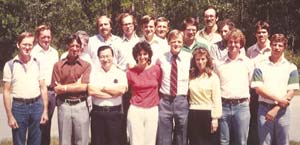 Tom Prickett and the District staff who participated in his workshop in 1980. Prickett is in the center, wearing a tie. District software engineer Herb Bryant is pictured in the back row, fifth from the left.
Tom Prickett and the District staff who participated in his workshop in 1980. Prickett is in the center, wearing a tie. District software engineer Herb Bryant is pictured in the back row, fifth from the left.
A giant in the field of groundwater studies who was influential in the District’s early groundwater modeling efforts passed away this September. Thomas Prickett, 71, of Urbana, Illinois, died Sept. 13 in Indianapolis.
Prickett is known for being the principal developer of one of the first digital computer groundwater flow models called the Prickett-Lonnquist Aquifer Simulation Model (PLASM). In 1980 when the District was beginning its groundwater regulation program, Prickett led District employees through an intense, weeklong workshop on how to use PLASM to evaluate permits.
Herb Bryant, a District software engineer, was one of the dozen employees who participated in the training and installed Prickett’s program on District computers.
“Everyone who participated in the workshop felt they were ‘in on the ground floor’ of something important,” said Bryant. “I always wondered how I lucked into being part of it because it wasn’t just another routine training class.”
Prickett’s work in digital computer groundwater flow models set the stage for the USGS MODFLOW model, developed in the 1980s by Mike McDonald and Arlen Harbaugh, which is now the worldwide standard. Prickett and his colleagues also developed a random-walk transport model, which is a way to monitor how contaminants flow through ground water, as well as other models.
“Tom was a ‘groundwater guru’ who continues to lead the way for us all,” said David Moore, District executive director. “He will be missed.”
Prickett’s career spanned nearly 50 years and included groundwater research, aquifer evaluation, wellfield development and design, mining impact analysis, mass transport investigation, computer modeling and lecturing, and serving as an expert witness for litigation at all levels of the judicial system.
L. M. “Buddy” Blain, who worked for the District as legal counsel in the 1970s, recorded an oral statement from Prickett in March as part of the Florida Water Management History Project. The project is being conducted through the University of Florida.
“Tom played a very significant role in water management throughout the United States, but especially through his work in Florida,” said Blain.
